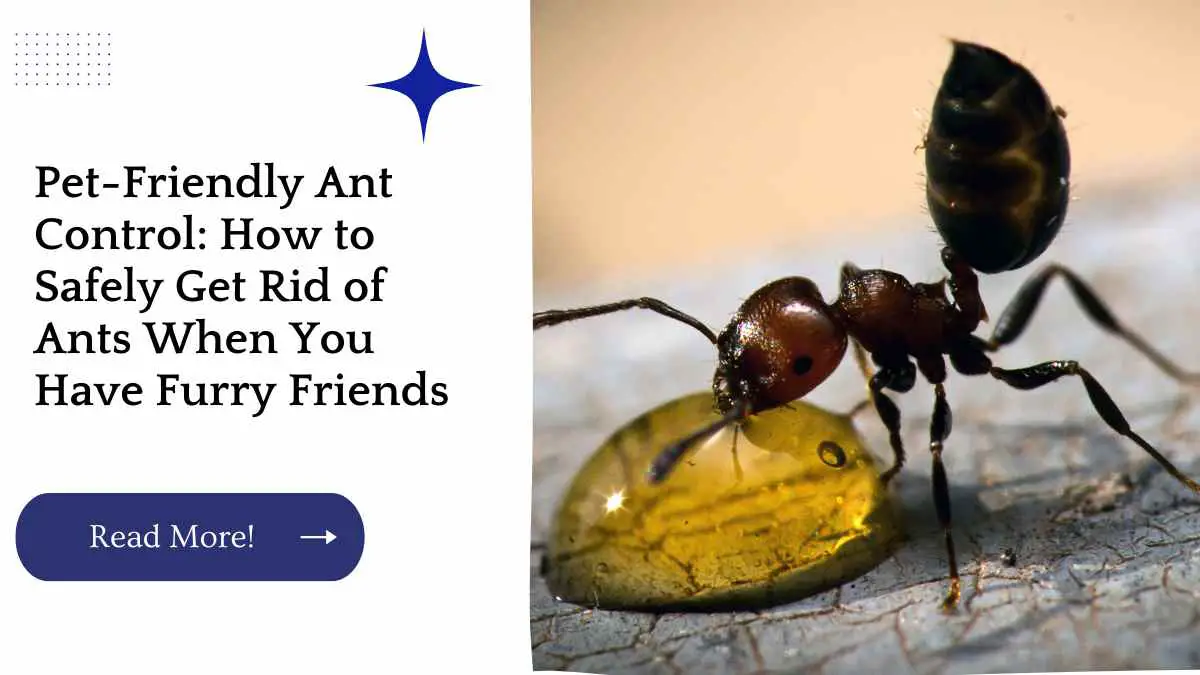Ant infestations can be quite bothersome, especially when you have furry friends at home. Conventional ant control methods can be harmful to pets, so it’s crucial to find safe and effective solutions. In this article, we’ll explore pet-friendly ant control methods, prevention tips, and when to call a professional exterminator.
| Takeaways |
|---|
| It is possible to safely and effectively get rid of ants when you have pets in the home. |
| There are many pet-friendly ways to address ant control, such as using cinnamon, vinegar, or citrus fruits. |
| Keeping your home clean and eliminating standing water sources can help prevent ant infestations. |
| While most ants are harmless to pets, some species can bite or sting and cause discomfort. |
| If your pet exhibits signs of pain or discomfort from an ant bite/sting, contact your veterinarian for advice on how to treat the issue. |
Understanding Ant Infestations
Identifying common ants
The first step in dealing with ant infestations is identifying the species you’re dealing with. Common household ants include carpenter ants, odorous house ants, and pavement ants. Knowing the species can help you choose the best treatment method.
Are you struggling with ants in your kitchen? Our guide on eradicating ants from your food storage areas provides helpful tips and tricks to keep your kitchen ant-free for good!
Signs of ant infestations
Ants leave behind some telltale signs, such as trails, nests, and debris from their activities. Look for these indicators to determine if you have an ant problem.
Why Conventional Ant Control Methods Can Be Harmful to Pets
Traditional ant control methods often use chemicals that can be toxic to pets. Ingesting or coming into contact with these substances can lead to serious health issues, making it necessary to find safer alternatives.
If your furry friend has fleas, it’s important to address the problem right away. Our guide on getting rid of fleas on a dog provides expert advice on how to safely and effectively treat your pet for fleas.
Pet-Friendly Ant Control Solutions
Natural remedies
There are several natural remedies you can use to control ants that won’t harm your pets:
- Diatomaceous earth: Sprinkle food-grade diatomaceous earth around the affected areas to kill ants without harming your pets.
- White vinegar: A solution of white vinegar and water can be used to clean surfaces and disrupt ant trails.
- Baking soda and sugar: Mix equal parts of baking soda and sugar, then place the mixture near ant trails. The ants will carry the mixture back to their nest, killing the colony.
| Solution | Description |
|---|---|
| Cinnamon | Strong scent that repels ants |
| Vinegar and Water | Natural deterrent that disrupts ants’ pheromone trails |
| Citrus Fruits | High acidity and citrus scent make them unappealing to ants |
| Borax and Sugar | Non-toxic bait that attracts and kills ants |
| Boiling Water | An effective way to kill ants and destroy their nests |
| Essential Oils | Certain oils, like peppermint or tea tree oil, repel ants |
Pet-safe commercial products
Several companies manufacture pet-safe ant control products. Look for those that use natural ingredients or are specifically labeled as pet-friendly.
Not all ants are pests! If you’re interested in learning more about the role of ants in the ecosystem, check out our article on why not all ants are pests to gain a deeper understanding of these fascinating creatures.
Prevention Is Key: Tips for Avoiding Ant Infestations
Keep your home clean
A clean home is less attractive to ants. Regularly clean countertops, floors, and pet food areas to prevent ant infestations.
Seal entry points
Inspect your home for gaps and cracks that ants may use as entry points. Seal these with caulk to keep ants out.
Maintain your yard
Trim bushes and trees, remove debris, and keep your lawn well-maintained to reduce the likelihood of ants entering your home.
When to Call a Professional Exterminator
If your ant problem persists or worsens despite using pet-friendly methods, it may be time to call a professional exterminator. Inform them about your pets and request pet-safe treatments.
| Signs of Infestation | Description |
|---|---|
| Large or Multiple Nests | Indicates a significant ant population and potential damage to your property |
| Persistent Problem | Ants continuing to infest even after using prevention methods and pet-safe solutions |
| Harming Your Pet | Certain species of ants can pose a risk to your pets if they bite or sting |
| Allergic Reactions | If you or your pets experience severe allergic reactions to ant bites or stings |
| Unknown Ant Species | It can be difficult to identify the species and therefore determine the best course of action |
Common Concerns and Tips for Pet Owners
- Always supervise your pets when applying ant control treatments.
- Store ant control products out of reach of pets.
- Regularly check your pet’s food and water bowls for signs of ants
- Keep an eye on your pet’s behavior for any signs of distress or illness after using ant control methods.
Ants in your garden can be a nuisance, but it’s important to find a balance between pest control and promoting biodiversity. Our article on managing ants in your garden provides tips on how to do just that!
Frequently Asked Questions
1. Can I use essential oils to repel ants?
While some essential oils can be effective in repelling ants, be cautious when using them around pets. Some essential oils can be toxic to animals, so always consult your veterinarian before using them in your home.
2. How do I keep ants out of my pet’s food and water bowls?
One effective method is to create a barrier around the bowls using a shallow dish filled with water. Place the pet’s bowls inside the dish, creating a “moat” that ants can’t cross.
3. Are there any plants that can help repel ants?
Yes, some plants, such as mint, lavender, and tansy, can help deter ants. Plant these in your garden or around your home’s foundation to keep ants at bay.
4. Can I use borax-based ant baits in a pet-friendly home?
Borax can be toxic to pets if ingested in large quantities. If you choose to use borax-based ant baits, ensure they are placed in areas inaccessible to your pets.
5. How do I clean up ant trails without harming my pets?
Use a solution of equal parts white vinegar and water to clean up ant trails. This mixture is effective in removing the pheromone trails ants leave behind, and it’s safe for use around pets.
Fleas are pesky little insects that can be difficult to get rid of. If you’re struggling with a flea infestation in your home, our guide on easy tips for getting rid of fleas can help you kick the problem to the curb!
Further Reading
Here are some additional resources to help you safely and effectively get rid of ants when you have pets at home:
How to Safely Get Rid of Ants When You Have Pets in Richmond Hill: This article provides tips and advice for pet owners who are struggling with ant control in their home.
How to Get Rid of Ants When You Have a Dog or Cat in the House: This article offers practical solutions for getting rid of ants that won’t harm your pets.
Pet-Safe Pest Control: This guide provides pet owners with a comprehensive overview of pet-safe pest control methods.
FAQs
Here are some frequently asked questions about pet-friendly ant control:
What are some pet-safe ways to get rid of ants?
There are several pet-safe ways to get rid of ants, including using cinnamon, vinegar and water, and citrus fruits like lemon or orange.
Why are ants attracted to my pet’s food?
Ants are attracted to pet food because it is a source of sugar and protein, which are both essential components in their diet.
What can I do to prevent ants from getting into my home?
To prevent ants from getting into your home, make sure to keep your kitchen clean, seal all food containers, and eliminate any standing water sources.
Can ants harm my pets?
Most ants are harmless to pets. However, certain species of ants can bite or sting, which can cause irritation or even an allergic reaction.
How can I tell if my pet has been bitten/stung by an ant?
If your pet has been bitten or stung by an ant, you may notice swelling, redness, and/or itching at the site. They may also exhibit signs of pain or discomfort, such as whining, scratching, or limping.

Hello! I’m Hellen James, and I write about how to keep pests from invading your home. For the last 10 years, I’ve been working in pest control and am excited to share my expertise with you!


